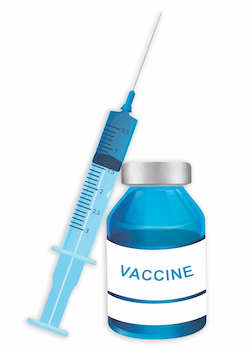Dentists administering vaccines gaining acceptance in states

The ADA and state dental societies are advocating giving dentists the ability to be an integral part of stopping the spread of the COVID-19 pandemic, with at least 20 states allowing dentists to administer the vaccine.
“As part of its ongoing COVID-19 vaccine strategy, the ADA supports recognizing dentists as vaccine providers,” said ADA President Daniel J. Klemmedson, D.D.S., M.D. “Having dentists administer vaccines in their communities helps improve the public vaccination rate, and it relieves some of the burden on the current vaccine provider network.”
The ADA House of Delegates passed Resolution 91H-2020 in October, which acknowledged that dentists have the requisite knowledge and skills to administer critical vaccines that prevent life- or health-threatening conditions.
“Because most of the states have recognized dentistry as essential, it is only fitting that we join front-line workers in the ability to administer the vaccine,” said David M. White, D.D.S., ADA Council on Government Affairs chair. “We are just very proud to be recognized as essential.”
States and territories are continuing to refine their COVID-19 vaccination plans following the Food and Drug Administration’s Dec. 11, 2020, authorization of the first COVID-19 vaccine, with efforts possibly including the use of dentists to assist with vaccination efforts. Final authority rests with each state in prioritizing the population to receive the vaccine and in administering it.
Working with state dental societies, the ADA has developed an interactive map that details dentists’ ability to administer the COVID-19 vaccination by state, as well as the phase of the state vaccination plan in which dentists will receive the COVID-19 vaccination.
Dr. White said advocacy occurred at two levels.
“We have advocated on the federal level through ADA Government Affairs to ask the Department of Health and Human Services to allow dentists to administer the COVID-19 vaccine,” he said. “More recently advocacy has occurred on the state level to change laws for dentists to administer all vaccines.”
To help states in introducing legislation to allow dentists to administer vaccines, the ADA has developed principles to aid state associations in advocating for this expansion of the scope of practice.
“The state Government Affairs department at the ADA provides assistance to the states on model legislation and strategy for successfully passing laws,” Dr. White said.
The ADA vaccine principles include participating in an online vaccination administration course, establishing patient relationships, complying with record-keeping requirements and falling under immunity statutes within the state. They are available at ADA.org/principles .
Karin Irani, D.D.S., California Dental Association trustee, volunteered on a day off to administer vaccines at a Los Angeles “Mega POD,” large-scale points of vaccination distribution chosen for their regional accessibility and ability to process thousands of people daily.
“This is the time for dentists to rise to the challenge and show our medical colleagues and the legislatures how dentists can contribute to the community's health,” Dr. Irani said. “State dental societies and the ADA should continue their advocacy efforts so dentists are recognized as an essential health care provider. The general population and the local authorities are starting to recognize dentists' importance in providing overall health care.”
Dr. Irani joked, “If we can make teenagers floss, we can get people vaccinated.”
The ADA will continue to monitor developments related to COVID-19 vaccine approval and administration on behalf of the profession and public. The Centers for Disease Control and Prevention offers training on its website on how to give the vaccine, and dental professionals can visit ADA.org/virus for more information.
COVID-19 Vaccination Administration Training and Educational Resources is a compilation of educational resources and training for health care providers administering the COVID-19 vaccine. It includes information from the vaccine manufacturers, the federal government, state government and non-governmental organizations.



